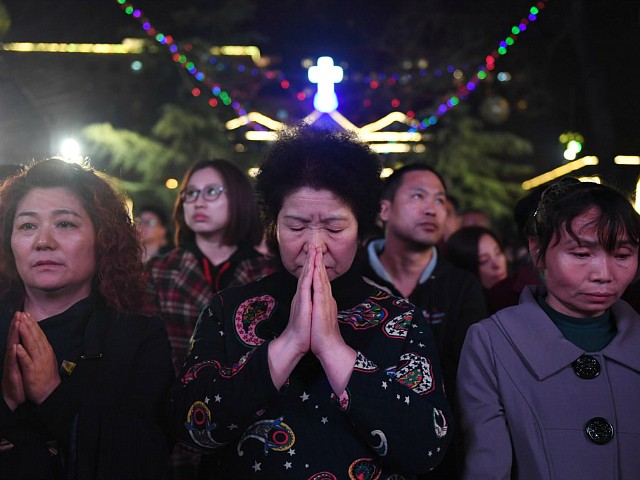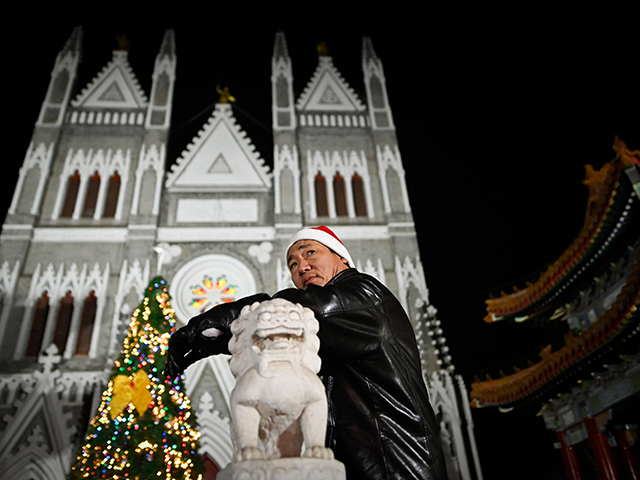The officially atheist Chinese Communist Party has largely outlawed discussion of Christmas and decorations in public to mark the holiday, reports indicated this week, as the world’s Christians prepare to mark the birth of their savior.
China is believed to be home to one of the largest Christian populations in the world — as many as over 100 million people, according to some estimates — and may soon eclipse many Western nations as one of the most Christian nations in the world. Some studies suggest that, by 2030, nearly 250 million Christians may live in China.
The growth of the faith has fueled severe repression on the part of the Communist Party, including allowing only regime-controlled churches, which promote anti-Christian communist ideology, to legally operate in the country. China discourages Christmas celebrations as invasive foreign displays. Under dictator Xi Jinping, the Communist Party has more rigorously persecuted the faith by sending officers to force Christians to take down crosses and other iconography in their homes, bulldozing churches, and imprisoning pastors and believers generally who pray outside of the Party-controlled apparatus.
Xi’s regime justifies the persecution by branding it “Sinicization,” or the practice of bringing Christianity in harmony with Chinese culture. Communism is an offshoot of Marxist thought originating in western Europe — which the Chinese government has also stated needs significant “Sinicization” to succeed.

Chinese Catholics attend a mass on Holy Saturday, part of Easter celebrations at Beijing’s government sanctioned South Cathedral on March 31, 2018. (GREG BAKER/AFP/Getty Images)
According to Christianity Today, multiple local governments in some of the nation’s most populous provinces issued edicts banning Christmas decorations in 2018 that have persisted through this year and show no signs of being softened. Universities also banned “celebrating or talking about Christmas on social media.” That ban was expanded to outlaw most discussion of Christianity on social media by anyone, not just students, in March.
The exceptions are the government entities in charge of controlling Christianity. China has five legal religions – Islam, Taoism, Buddhism, Catholicism, and Protestant Christianity – all of which are governed by Party officials. The Chinese Catholic Church is divorced from the Vatican and run by “clergy” chosen by the Communist Party. The Three-Self Patriotic Church, the official name of the Protestant entity, largely exists to venerate the Communist Party, as well.
The Three-Self Church, for example, led efforts to honor the memory of former Chinese President Jiang Zemin, who died in November at the age of 96. Jiang took over the Party in the aftermath of the Tiananmen Square massacre and dedicated his tenure to pressuring the world into doing business with China and overlooking the mass murder that eliminated the pro-democracy movement in the country. Jiang repeatedly justified the Tiananmen Square massacre and has been credited with directing violent efforts to eradicate all religion in China, particularly Islam, Christianity, and the Falun Gong spiritual movement.
The leaders of the Three-Self Church honored Jiang in November as a “great Marxist we all love and miss,” according to the anti-communist newspaper Epoch Times. The regime church reportedly ordered Christians to specifically praise Jiang for the “sinicization of Christianity.”
Last year, the Three-Self Church opened an exhibit titled “Chinese Christianity Loves the Party, the Country, and Socialism” to promote the idea that Christianity cannot operate independently of communism.
“The Chinese Communist Party has been inextricably linked to Christianity from the day of its birth,” a church leader promoting the event declared at the time.
The Communist Party has also endeavored to distort nearly every message from Christian leaders and the core of the faith itself. In 2019, the Chinese government announced that it began working on a new “translation” of the Bible that would “sinicize” the document by effectively rewriting critical narratives within it. The project has not been completed at press time, but the edits that have been made public indicate that the Party is particularly striving to undermine the messages of Jesus in the New Testament. In one example shared by the Christian aid group Voice of the Martyrs (VOM), the communist translation of Jesus’s encounter with a woman accused of adultery – which in the true Bible ends with Jesus forgiving the woman and advising others, “let any one of you who is without sin be the first to throw a stone at her” – concludes with Jesus stoning the woman himself.
“The Chinese Communist Party (CCP) announced plans to update the Bible to ‘keep pace with the times.’ The revisions will include adding ‘core socialist values’ and removing passages that do not reflect communist beliefs,” a VOM warned.
The intrusion into the faith has sent many Christians fleeing into illicit “house churches” – assemblies in homes meant to create spaces for Christians to pray outside the watchful eye of the government. “House church” attendees face arrests and disappearances, as well as a top-down campaign branding Christians traitors to their Chinese identity. Chinese Pastor Sean Long recalled to Christianity Today a common communist slogan, “One more Christian, one less Chinese,” and repeated government declarations of Christianity as an invasive cultural phenomenon from the West.
In reality, archeological evidence suggests Christianity arrived in China as early as the 600s AD, not significantly later than when it arrived in Britain – and over a millennium before the arrival of communism in China.
“Intellectuals inspired by Christianity introduced notions such as individualism, democracy, and international law to a curious Chinese population,” Lipton Matthews, writing for the Mises Institute, noted this week. “Since Christianity has been a potent source of vitality in China for over a century, tolerating this instrument of subversion is politically untenable for many in the Communist Party”


COMMENTS
Please let us know if you're having issues with commenting.